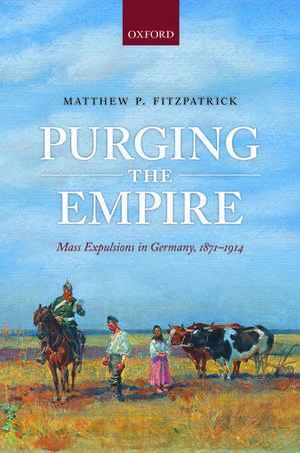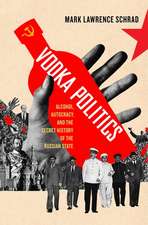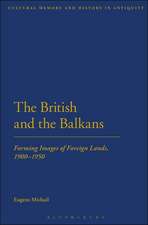Purging the Empire: Mass Expulsions in Germany, 1871-1914
Autor Matthew P. Fitzpatricken Limba Engleză Hardback – 7 ian 2015
Preț: 673.12 lei
Preț vechi: 965.54 lei
-30% Nou
Puncte Express: 1010
Preț estimativ în valută:
128.80€ • 134.75$ • 106.100£
128.80€ • 134.75$ • 106.100£
Carte tipărită la comandă
Livrare economică 24-29 martie
Preluare comenzi: 021 569.72.76
Specificații
ISBN-13: 9780198725787
ISBN-10: 0198725787
Pagini: 320
Dimensiuni: 162 x 238 x 25 mm
Greutate: 0.61 kg
Editura: OUP OXFORD
Colecția OUP Oxford
Locul publicării:Oxford, United Kingdom
ISBN-10: 0198725787
Pagini: 320
Dimensiuni: 162 x 238 x 25 mm
Greutate: 0.61 kg
Editura: OUP OXFORD
Colecția OUP Oxford
Locul publicării:Oxford, United Kingdom
Recenzii
A well-organized, richly sourced and powerfully argued book that asks hard questions and resists easy answers.
The strength of his first book consists in identifying disparate voices and ideological undercurrents leading to political decision making. This is also a strength of his latest book on mass expulsions in the German Empire, 1871-1914....The book's practical conclusions are equally important as its theoretical ones....The ramifications of Fitzpatrick's exemplary study go far beyond the history of the Kaiserreich. They will be highly relevant for scholars working in a range of academic areas, including migration studies, political discourse analysis, legal and constitutional studies, and colonial studies.
Matthew P. Fitzpatrick's meticulous study of the political and legal thinking that aimed at justifying expulsions from the German Empire within the rule of law could not be more timely ... Due to its thorough steeping in archival materials, legal literature and the press, the monograph stands a good chance of becoming an important point of reference for students of international relations, nationalism, ethnic cleansing and genocide.
Fitzpatrick delivers a formidable exposition of the operations of political power; of political divisions, legal cultures, of "exceptional law," notions of conceivable and acceptable uses of power, and of the interplay and conflict between authoritarian and constitutional impulses that characterized the Kaiserreich. He is especially captivating, for instance, when interpreting the wars in German Southwest Africa as expulsions or when scrutinizing the significances of race and nationality in the expelling of Jews in eastern Prussia.
For German historians, this monograph represents a completely novel perspective on imperial Germany ... Purging the Empire amply demonstrates the value of a comparative approach to expulsions and should encourage historians of Jesuits to compare expulsions of Jesuits at other times and in other places to those of other contemporary groups, non-religious as well as religious, and to consider their implications for the civil liberties of all citizens of the state.
Matthew P. Fitzpatrick's well-researched study ... effectively shows, the debate on the continuities, or in this case the lack thereof, between the Third Reich and earlier German empires continues to yield productive and insightful results.
Fitzpatrick's well-researched, fluently written, and impressively argued study nuances our understanding of law, politics, and society in the Kaiserreich ... These findings are an important corrective against the position, still popular in the historiography, that there were significant continuities between imperial Germany's nationality policy and the radical biopolitics of the Third Reich.
The strength of his first book consists in identifying disparate voices and ideological undercurrents leading to political decision making. This is also a strength of his latest book on mass expulsions in the German Empire, 1871-1914....The book's practical conclusions are equally important as its theoretical ones....The ramifications of Fitzpatrick's exemplary study go far beyond the history of the Kaiserreich. They will be highly relevant for scholars working in a range of academic areas, including migration studies, political discourse analysis, legal and constitutional studies, and colonial studies.
Matthew P. Fitzpatrick's meticulous study of the political and legal thinking that aimed at justifying expulsions from the German Empire within the rule of law could not be more timely ... Due to its thorough steeping in archival materials, legal literature and the press, the monograph stands a good chance of becoming an important point of reference for students of international relations, nationalism, ethnic cleansing and genocide.
Fitzpatrick delivers a formidable exposition of the operations of political power; of political divisions, legal cultures, of "exceptional law," notions of conceivable and acceptable uses of power, and of the interplay and conflict between authoritarian and constitutional impulses that characterized the Kaiserreich. He is especially captivating, for instance, when interpreting the wars in German Southwest Africa as expulsions or when scrutinizing the significances of race and nationality in the expelling of Jews in eastern Prussia.
For German historians, this monograph represents a completely novel perspective on imperial Germany ... Purging the Empire amply demonstrates the value of a comparative approach to expulsions and should encourage historians of Jesuits to compare expulsions of Jesuits at other times and in other places to those of other contemporary groups, non-religious as well as religious, and to consider their implications for the civil liberties of all citizens of the state.
Matthew P. Fitzpatrick's well-researched study ... effectively shows, the debate on the continuities, or in this case the lack thereof, between the Third Reich and earlier German empires continues to yield productive and insightful results.
Fitzpatrick's well-researched, fluently written, and impressively argued study nuances our understanding of law, politics, and society in the Kaiserreich ... These findings are an important corrective against the position, still popular in the historiography, that there were significant continuities between imperial Germany's nationality policy and the radical biopolitics of the Third Reich.
Notă biografică
Matthew P Fitzpatrick is the author of Liberal Imperialism in Germany (2008) and the editor of Liberal Imperialism in Europe (2012). He has also written on aspects of imperialism in Europe and ancient Rome.
















